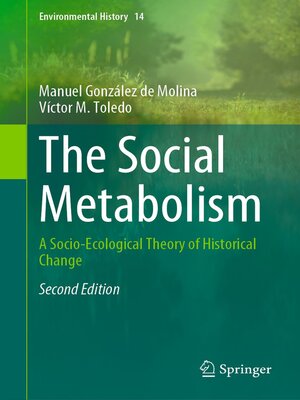The Social Metabolism
ebook ∣ A Socio-Ecological Theory of Historical Change · Environmental History
By Manuel González de Molina

Sign up to save your library
With an OverDrive account, you can save your favorite libraries for at-a-glance information about availability. Find out more about OverDrive accounts.
Find this title in Libby, the library reading app by OverDrive.



Search for a digital library with this title
Title found at these libraries:
| Library Name | Distance |
|---|---|
| Loading... |
This book helps readers to understand the fast growing and timely concept of social metabolism. The authors shed a light on the different existing terms and methodologies that have been developed over the years. Through the study of history, readers will get an understanding of the main currents or schools that exist around this concept and their main findings. Also provides examples of how to apply the metabolic approach at different territorial and temporal scales and using different methodological tools. The book presents a novel socio-metabolic theory of historical change, in which biophysical and social variables are combined in an integrated way to understand the dynamics of socio-metabolic transitions.
In this second edition, the authors provide valuable updates and new sections to each of the previous chapters. New insights on global phenomena like climate change and the environmental crisis are also considered. As readers will learn, a paradigm shift in almost all areas of research and society will be needed to face the challenges created by the modern industrial society. The authors use a look back in history, to explore the relationship between humans and nature from an evolutionary and thermodynamic perspective. With this approach, readers from history, environmental sciences and social sciences will get valuable insights on possible solutions.
In this second edition, the authors provide valuable updates and new sections to each of the previous chapters. New insights on global phenomena like climate change and the environmental crisis are also considered. As readers will learn, a paradigm shift in almost all areas of research and society will be needed to face the challenges created by the modern industrial society. The authors use a look back in history, to explore the relationship between humans and nature from an evolutionary and thermodynamic perspective. With this approach, readers from history, environmental sciences and social sciences will get valuable insights on possible solutions.







